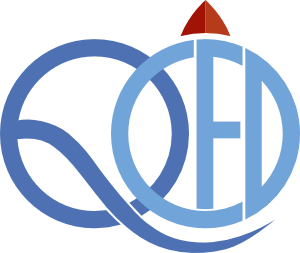Partners
Quantum Computational Fluid Dynamics Project will adopt an agile software development cycle for generating a versatile QCFD software framework. The main reasons for this choice are the continually changing quality and size of the quantum hardware and the breadth of CFD examples and user requirements that the framework is expected to be able to handle. Agile software development delivers updates frequently and can quickly respond to changing user requirements and hardware capabilities. It is well suited for experienced teams with different backgrounds working together. The basic development cycle is shown in the figure below.
This project requires wide-ranging expertise from industrial CFD to gate-level implementations of software on flagship quantum hardware platforms. We have assembled an interdisciplinary team where each partner provides unique expertise that is necessary for this project to succeed.

D. Jaksch, a Physics Professor at the University of Hamburg, brings vast experience from coordinating quantum technology projects at the University of Oxford. With a focus on ultracold atom platforms since 1998, he collaborates with industry partners like IBM and BAE systems. His expertise aligns with work packages 3, 4, 5, 7, and 8, making his coordination skills valuable for work package 10.
Prof. Dr. Dieter Jaksch, Principal Investigator
dieter.jaksch@uni-hamburg.de
University of Hamburg
T. Rung, leading the fluid dynamics and CFD team at TUHH, has extensive experience in computational modeling of multi-phase, multi-continua, and impact problems. As a professor and managing director of the North German Supercomputer Alliance, he has coordinated work packages in previous EU projects and currently co-coordinates research training groups. In QCFD, his team contributes core CFD examples in work packages 1 and 2, validates them, ensures industrial involvement in WP 8, and facilitates the transfer of classical to QCFD approaches in WP 3.
Prof. Dr. Thomas Rung, Principal Investigator
thomas.rung@tuhh.de
Hamburg University of Technology
F. Motzoi, leading the Quantum Optimal Control Theory group at FZJ, has 14 years of expertise in controlling and optimizing superconducting qubit systems. His work includes leakage removal, high-fidelity gate design, and optimization using machine learning. He will lead the development of hardware-optimized QCFD software for superconducting qubits in work packages 5, 6, and 7, collaborating with TUC to share expertise across different hardware platforms.
Dr. Felix Motzoi, Principal Investigator
f.motzoi@fz-juelich.de
Forschungszentrum Jülich
B. Kraus, chair of the “Quantum Algorithms-and Applications” group at the Physics Department at TUM, is working on various topics within quantum information theory. Within work package 8 she and her team will contribute to the derivation of validation protocols for QCFD algorithms and to the understanding of entanglement generated in such algorithms.
Prof. Dr. Barbara Kraus, Principal Investigator
barbara.kraus@ph.tum.de
Technical University of Munich
Paolo Geremia received his M.Sc. in Mechanical Engineering from the University of Trieste in 2002. From 2002 to 2010 Paolo worked at ESTECO Srl. Paolo has extensive experience in CFD modeling, GUI development, multi-disciplinary optimization, and application of multiple CAE tools for industrial-scale applications. Paolo is the General Manager of ENGYS in Italy.
Within the QCFD research effort, the ENGYS team will provide support for the development of coupling and translation interfaces between the OpenFOAM library and the QCFD solution system under Work Package 1-2-3-8-9. Further efforts will focus on providing compatible geometry descriptions to the QCFD solution framework and assisting with the development of conventional CFD methods within the OpenFOAM framework for the validation of QCFD’s predictive capabilities.
Paolo Geremia, Principal Investigator
p.geremia@engys.com
ENGYS

Dimitris Angelakis, a renowned quantum physics and computing professor at TU Crete, specializes in quantum simulation and NISQ implementations. Recognized for foundational work, he optimizes codes for various quantum platforms, applies quantum control techniques, and collaborates across hardware groups for efficient implementation. His collaboration with FZJ in work packages 5, 6, and 7 promotes expertise exchange across diverse platforms.
Prof. Dr. Dimitris Angelakis, Principal Investigator
dimitris.angelakis@gmail.com
Technical University of Crete
Martin Kiffner, Head of Algorithms at PLANQC, has extensive experience in quantum research collaborations, including work with Dieter Jaksch on projects like QIPEST and Hub NQIT. Specializing in quantum algorithms for non-linear optimization, he has collaborated with industry leaders such as IBM and BAE Systems. With a strong track record reflected in about 40 peer-reviewed papers, an h-index of 22, and an i10 index of 39, his expertise aligns with work packages 3, 4, 5, 7, and 8, while his industry connections are valuable for work packages 1 and 2.
Dr. Martin Kiffner, Principal Investigator
martin@planqc.eu
PLANQC

Belda Atilla is an Industrial Engineer with 18 years of experience in construction projects and EU-funded projects across various countries. Currently, she serves as the Project Manager for the QCFD Project. In this role, she acts as the intermediary among the QCFD project members, university administrations, and the EU Commission, offering support on all administrative matters to the project members.
Belda Atilla, Project Manager
belda.atilla@uni-hamburg.de
University of Hamburg
